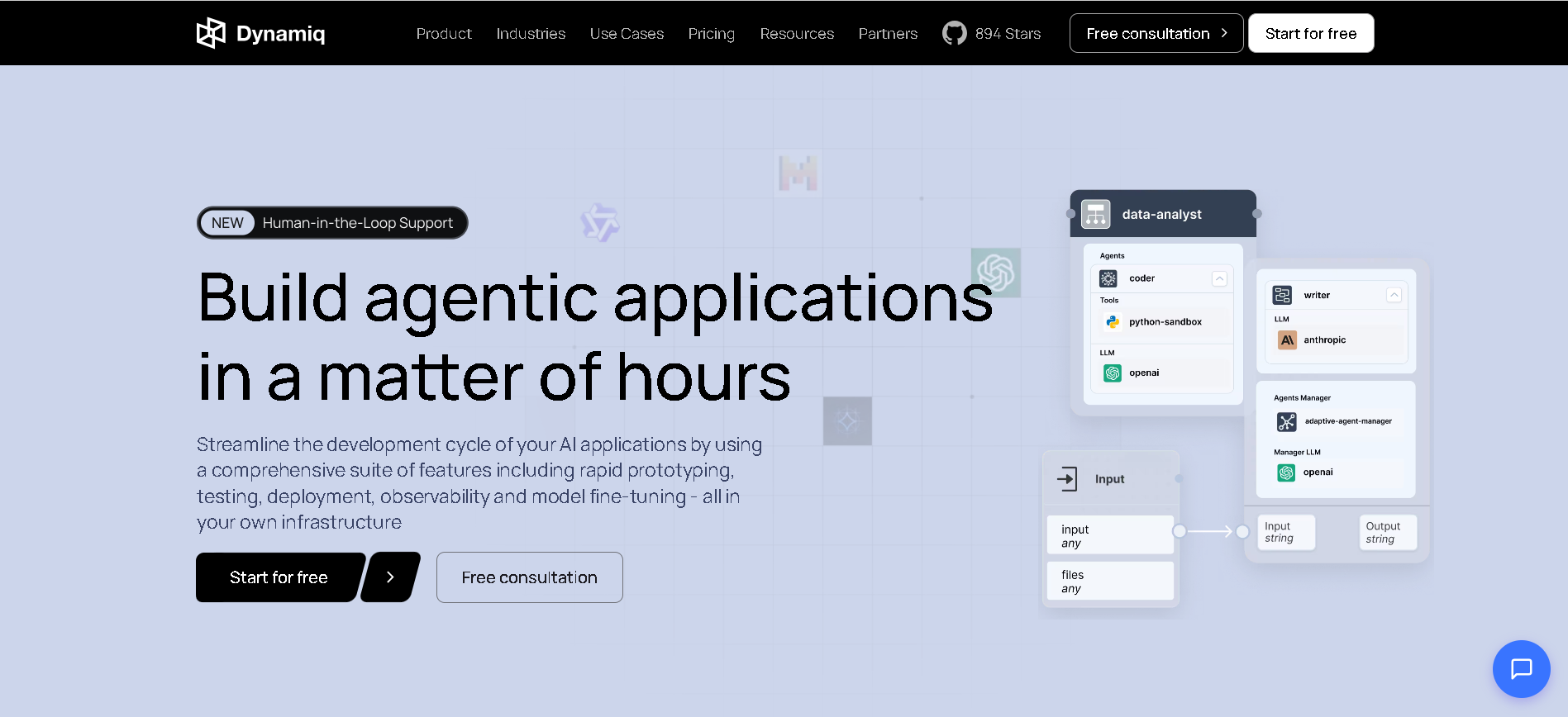- Developers & Engineers: Rapidly prototype, orchestrate, fine-tune, and deploy AI agents and workflows using APIs or visual tools.
- Enterprises & Compliance Teams: On-prem or VPC deployment with SOC 2, HIPAA, GDPR compliance ensuring data sovereignty.
- Product & IT Teams: Manage lifecycle of AI assistants, monitor performance, enforce guardrails, and troubleshoot via observability.
- Data & Analytics Teams: Build RAG-powered knowledge bases and autonomous data-analyst agents with low-code templates.
- Business Users & Non-Tech Teams: Use intuitive drag-and-drop tools to automate workflows without writing extensive code.
How to Use Dynamiq?
- Agent Builder: Use low-code visual editors with pre-built templates and Python extension to create AI agents.
- Workflow Automation: Drag-and-drop workflow modules to automate tasks like document review, fraud detection, and support response.
- RAG & Knowledge Integration: Connect enterprise data sources and enable retrieval-augmented generation.
- Deployment & Guardrails: Deploy agents on-premise or cloud-privately, setting validation rules for structured JSON/YAML output, filters, and policies.
- Fine-Tuning & Observability: Fine-tune LLMs with private data; monitor interactions, quality, token usage, error rates, and receive alerts.
- Unified GenAI Ops: Combines agent creation, RAG, deployment, observability, and guardrails in one platform.
- Enterprise Security: SOC 2, HIPAA, GDPR support with VPC, on-prem deployment, fine-grained access control.
- Low-Code, High Flexibility: Visual builder plus Python extensibility enables both non-technical and technical teams to customize agents.
- Deep Observability: Live metrics, logs, LLM-as-judge evaluation, alerting, and drift detection ensure reliability.
- Multi-Agent Orchestration: Support for specialized agents coordinating within workflows to handle complex, modular tasks.
- End-to-end platform—from idea to production—with no glue code
- Strong enterprise compliance and security posture
- Visual low‑code builders with developer-level customization
- Built-in fine-tuning and observability pipelines
- Scalable multi-agent orchestration and RAG-ready workflows
- Platform complexity may be overwhelming for smaller teams
- On-prem deployments require infrastructure management
- May be costly for low-volume or small-scale use cases
Free
$ 0.00
1 deployed workflow
1 RAG knowledge base
1,000 workflow executions per month
Community-based customer support
Solo
$ 29.00
5 deployed workflows
5 RAG knowledge bases
10,000 workflow executions per month
Email-based customer support
Starter
$ 125.00
10 deployed workflows
10 RAG knowledge bases
10 fine-tuned models
50,000 workflow executions per month
Email-based customer support
Growth
$ 975.00
20 deployed workflows
20 RAG knowledge bases
20 fine-tuned models
100,000 workflow executions per month
Email-based customer support
Proud of the love you're getting? Show off your AI Toolbook reviews—then invite more fans to share the love and build your credibility.
Add an AI Toolbook badge to your site—an easy way to drive followers, showcase updates, and collect reviews. It's like a mini 24/7 billboard for your AI.
Reviews
Rating Distribution
Average score
Popular Mention
FAQs
Similar AI Tools
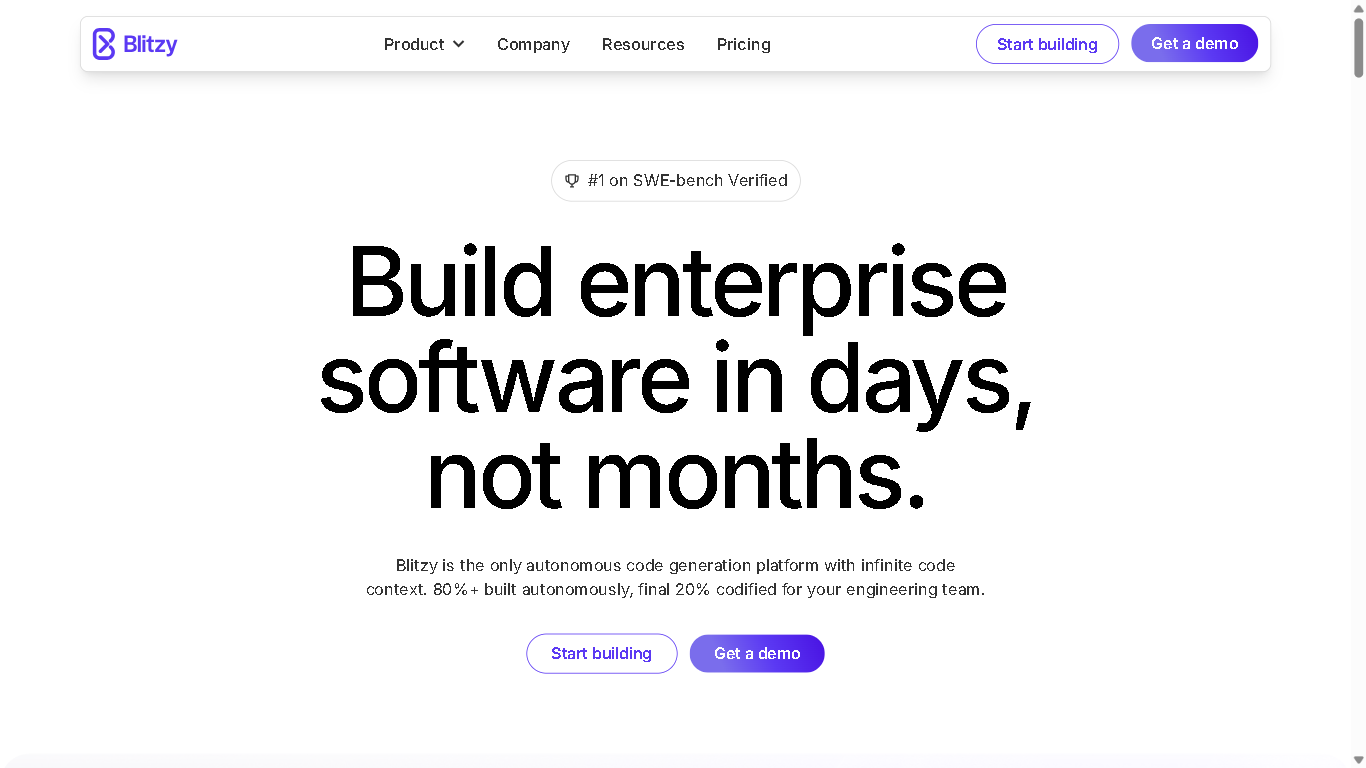
Blitzy
Blitzy is an AI-powered autonomous software development platform designed to accelerate enterprise-grade software creation. It automates over 80% of the development process, enabling teams to transform six-month projects into six-day turnarounds. Blitzy utilizes a multi-agent System 2 AI architecture to reason deeply across entire codebases, providing high-quality, production-ready code validated at both compile and runtime.

Blitzy
Blitzy is an AI-powered autonomous software development platform designed to accelerate enterprise-grade software creation. It automates over 80% of the development process, enabling teams to transform six-month projects into six-day turnarounds. Blitzy utilizes a multi-agent System 2 AI architecture to reason deeply across entire codebases, providing high-quality, production-ready code validated at both compile and runtime.

Blitzy
Blitzy is an AI-powered autonomous software development platform designed to accelerate enterprise-grade software creation. It automates over 80% of the development process, enabling teams to transform six-month projects into six-day turnarounds. Blitzy utilizes a multi-agent System 2 AI architecture to reason deeply across entire codebases, providing high-quality, production-ready code validated at both compile and runtime.

Sim Studio
Sim.AI is a cloud-native platform designed to streamline the development and deployment of AI agents. It offers a user-friendly, open-source environment that allows developers to create, connect, and automate workflows effortlessly. With seamless integrations and no-code setup, Sim.AI empowers teams to enhance productivity and innovation.

Sim Studio
Sim.AI is a cloud-native platform designed to streamline the development and deployment of AI agents. It offers a user-friendly, open-source environment that allows developers to create, connect, and automate workflows effortlessly. With seamless integrations and no-code setup, Sim.AI empowers teams to enhance productivity and innovation.

Sim Studio
Sim.AI is a cloud-native platform designed to streamline the development and deployment of AI agents. It offers a user-friendly, open-source environment that allows developers to create, connect, and automate workflows effortlessly. With seamless integrations and no-code setup, Sim.AI empowers teams to enhance productivity and innovation.
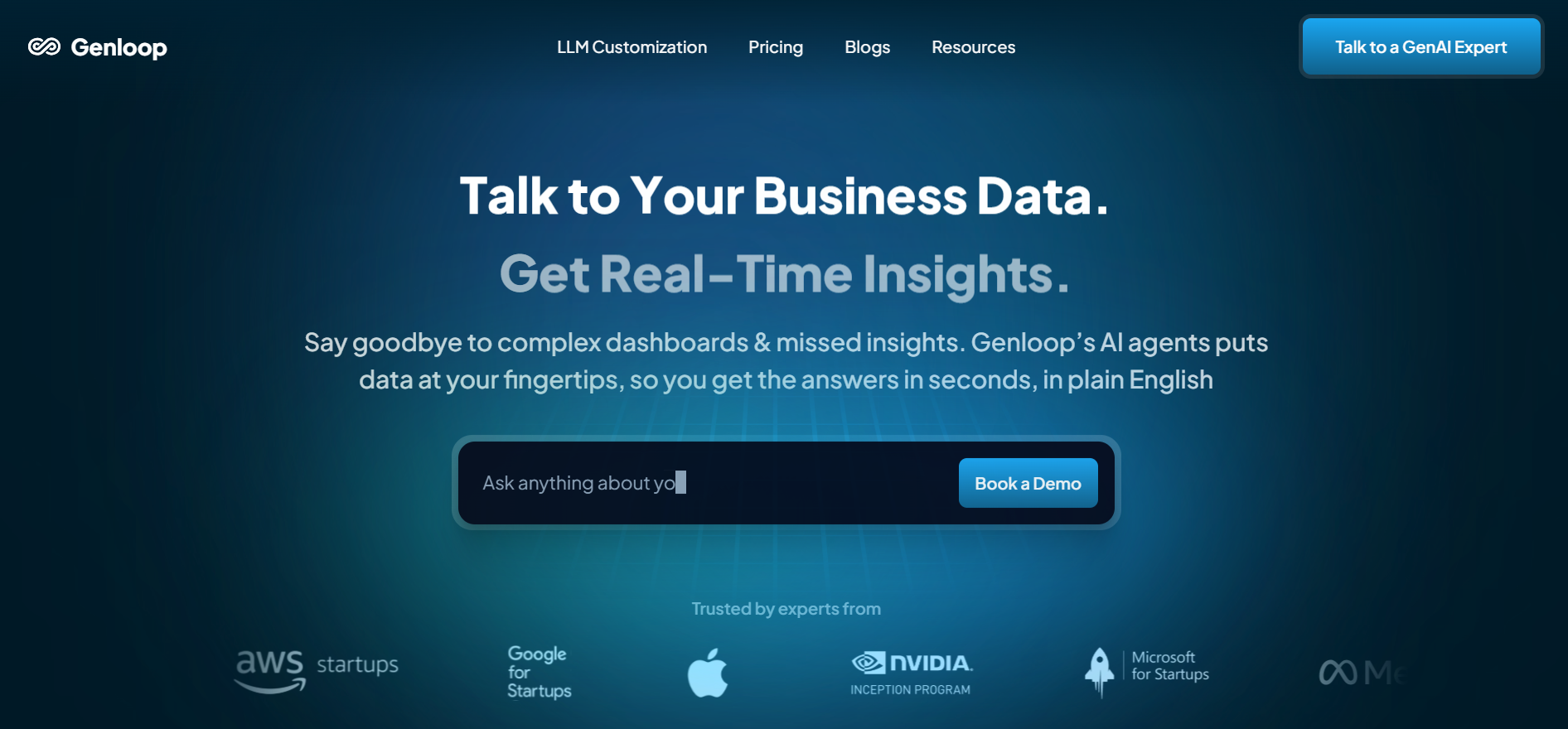

Genloop AI
Genloop is a platform that empowers enterprises to build, deploy, and manage custom, private large language models (LLMs) tailored to their business data and requirements — all with minimal development effort. It turns enterprise data into intelligent, conversational insights, allowing users to ask business questions in natural language and receive actionable analysis instantly. The platform enables organizations to confidently manage their data-driven decision-making by offering advanced fine-tuning, automation, and deployment tools. Businesses can transform their existing datasets into private AI assistants that deliver accurate insights, while maintaining complete security and compliance. Genloop’s focus is on bridging the gap between AI and enterprise data operations, providing a scalable, trustworthy, and adaptive solution for teams that want to leverage AI without extensive coding or infrastructure complexity.


Genloop AI
Genloop is a platform that empowers enterprises to build, deploy, and manage custom, private large language models (LLMs) tailored to their business data and requirements — all with minimal development effort. It turns enterprise data into intelligent, conversational insights, allowing users to ask business questions in natural language and receive actionable analysis instantly. The platform enables organizations to confidently manage their data-driven decision-making by offering advanced fine-tuning, automation, and deployment tools. Businesses can transform their existing datasets into private AI assistants that deliver accurate insights, while maintaining complete security and compliance. Genloop’s focus is on bridging the gap between AI and enterprise data operations, providing a scalable, trustworthy, and adaptive solution for teams that want to leverage AI without extensive coding or infrastructure complexity.


Genloop AI
Genloop is a platform that empowers enterprises to build, deploy, and manage custom, private large language models (LLMs) tailored to their business data and requirements — all with minimal development effort. It turns enterprise data into intelligent, conversational insights, allowing users to ask business questions in natural language and receive actionable analysis instantly. The platform enables organizations to confidently manage their data-driven decision-making by offering advanced fine-tuning, automation, and deployment tools. Businesses can transform their existing datasets into private AI assistants that deliver accurate insights, while maintaining complete security and compliance. Genloop’s focus is on bridging the gap between AI and enterprise data operations, providing a scalable, trustworthy, and adaptive solution for teams that want to leverage AI without extensive coding or infrastructure complexity.
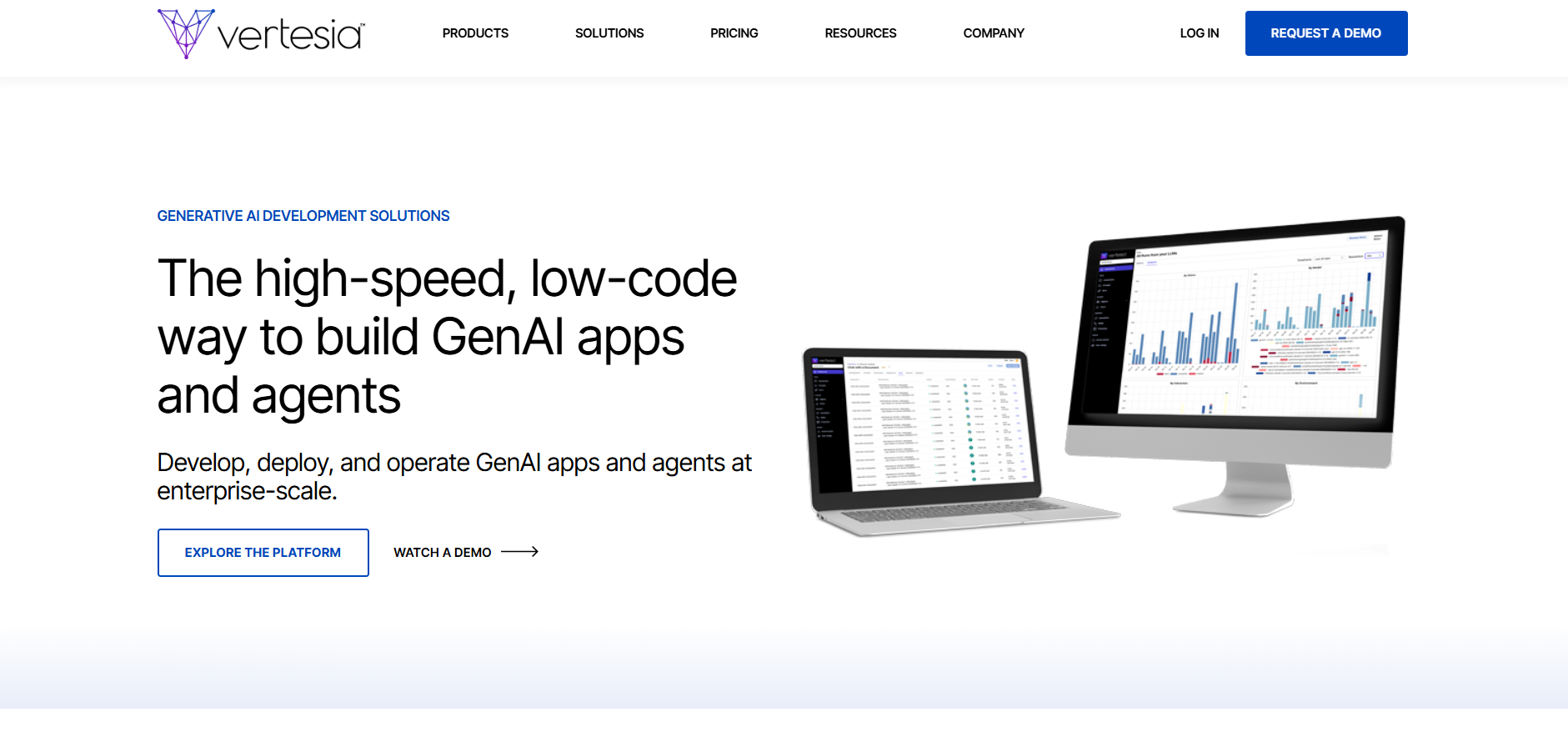

Vertesia HQ
Vertesia is an enterprise generative AI platform built to help organizations design, deploy, and operate AI applications and agents at scale using a low-code approach. Its unified system offers multi-model support, trust/security controls, and components like Agentic RAG, autonomous agent builders, and document processing tools, all packaged in a way that lets teams move from prototype to production rapidly.


Vertesia HQ
Vertesia is an enterprise generative AI platform built to help organizations design, deploy, and operate AI applications and agents at scale using a low-code approach. Its unified system offers multi-model support, trust/security controls, and components like Agentic RAG, autonomous agent builders, and document processing tools, all packaged in a way that lets teams move from prototype to production rapidly.


Vertesia HQ
Vertesia is an enterprise generative AI platform built to help organizations design, deploy, and operate AI applications and agents at scale using a low-code approach. Its unified system offers multi-model support, trust/security controls, and components like Agentic RAG, autonomous agent builders, and document processing tools, all packaged in a way that lets teams move from prototype to production rapidly.
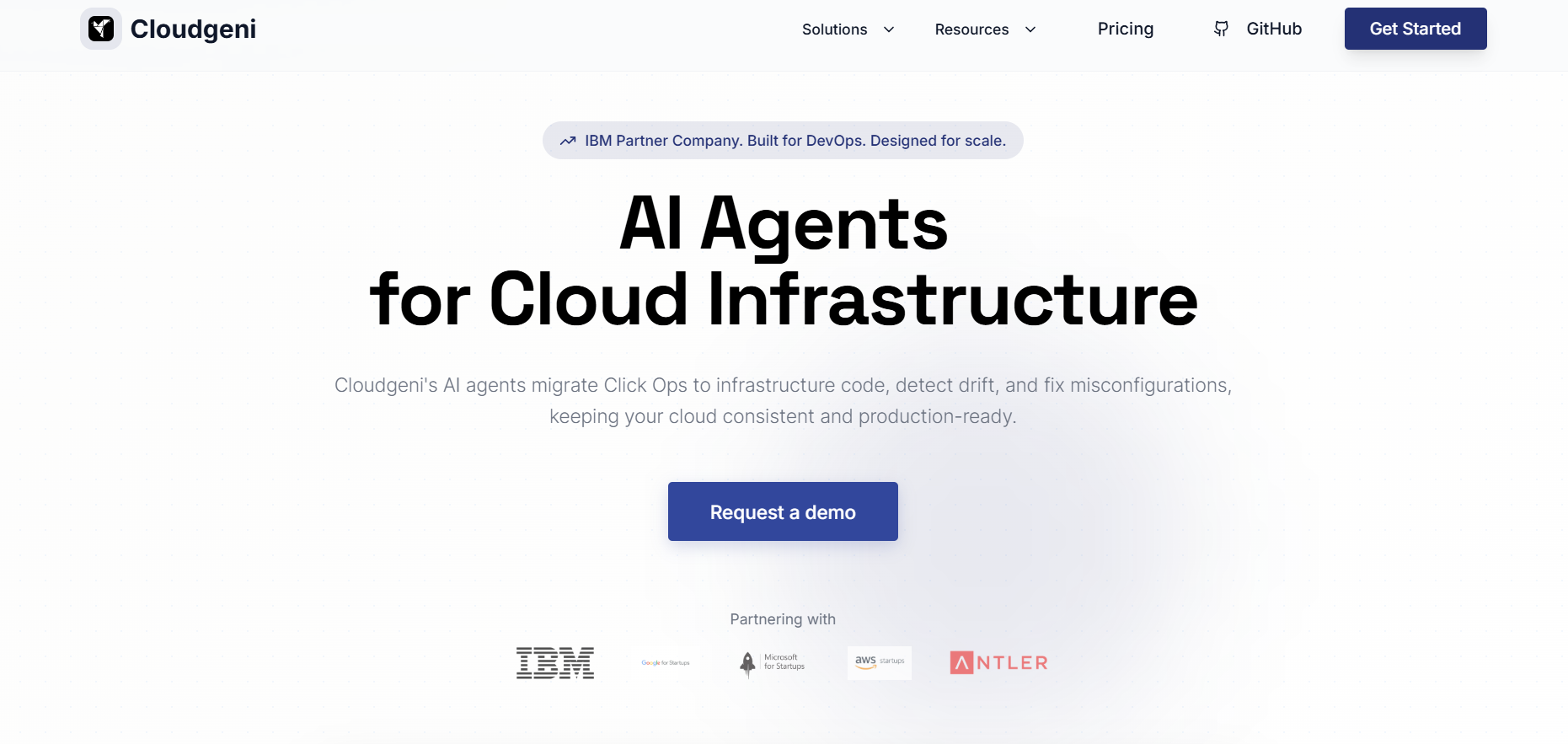

Cloudgen AI
CloudGeni AI is a cloud management and automation platform powered by artificial intelligence. It helps organizations optimize, monitor, and secure cloud infrastructure across multiple providers such as AWS, Azure, and Google Cloud. By using predictive analytics, CloudGeni automates cost control, resource scaling, and security compliance, enabling teams to reduce manual workload and improve operational efficiency. Designed for IT admins, DevOps teams, and cloud architects, it ensures cost transparency and performance reliability for complex cloud ecosystems.


Cloudgen AI
CloudGeni AI is a cloud management and automation platform powered by artificial intelligence. It helps organizations optimize, monitor, and secure cloud infrastructure across multiple providers such as AWS, Azure, and Google Cloud. By using predictive analytics, CloudGeni automates cost control, resource scaling, and security compliance, enabling teams to reduce manual workload and improve operational efficiency. Designed for IT admins, DevOps teams, and cloud architects, it ensures cost transparency and performance reliability for complex cloud ecosystems.


Cloudgen AI
CloudGeni AI is a cloud management and automation platform powered by artificial intelligence. It helps organizations optimize, monitor, and secure cloud infrastructure across multiple providers such as AWS, Azure, and Google Cloud. By using predictive analytics, CloudGeni automates cost control, resource scaling, and security compliance, enabling teams to reduce manual workload and improve operational efficiency. Designed for IT admins, DevOps teams, and cloud architects, it ensures cost transparency and performance reliability for complex cloud ecosystems.
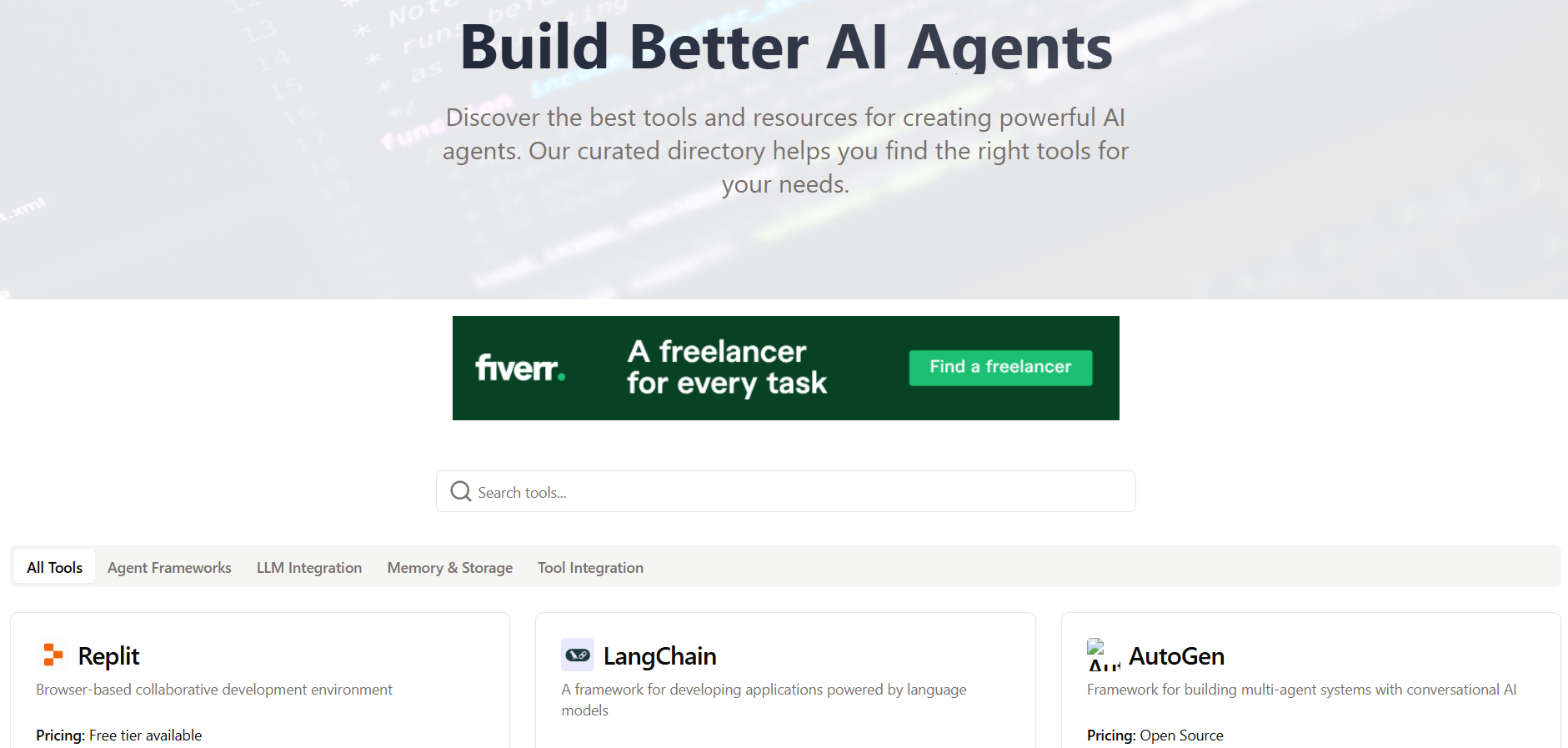
Build My Agents
BuildMyAgents AI is a no-code platform that allows users to create, train, and deploy AI agents for tasks like customer support, data handling, or automation. It simplifies complex AI development by providing a visual builder and pre-configured logic templates that anyone can customize without coding. Users can integrate APIs, connect data sources, and configure multi-agent workflows that collaborate intelligently. Whether for startups or enterprise solutions, BuildMyAgents AI empowers teams to automate operations and deploy AI systems quickly with full transparency and control.

Build My Agents
BuildMyAgents AI is a no-code platform that allows users to create, train, and deploy AI agents for tasks like customer support, data handling, or automation. It simplifies complex AI development by providing a visual builder and pre-configured logic templates that anyone can customize without coding. Users can integrate APIs, connect data sources, and configure multi-agent workflows that collaborate intelligently. Whether for startups or enterprise solutions, BuildMyAgents AI empowers teams to automate operations and deploy AI systems quickly with full transparency and control.

Build My Agents
BuildMyAgents AI is a no-code platform that allows users to create, train, and deploy AI agents for tasks like customer support, data handling, or automation. It simplifies complex AI development by providing a visual builder and pre-configured logic templates that anyone can customize without coding. Users can integrate APIs, connect data sources, and configure multi-agent workflows that collaborate intelligently. Whether for startups or enterprise solutions, BuildMyAgents AI empowers teams to automate operations and deploy AI systems quickly with full transparency and control.
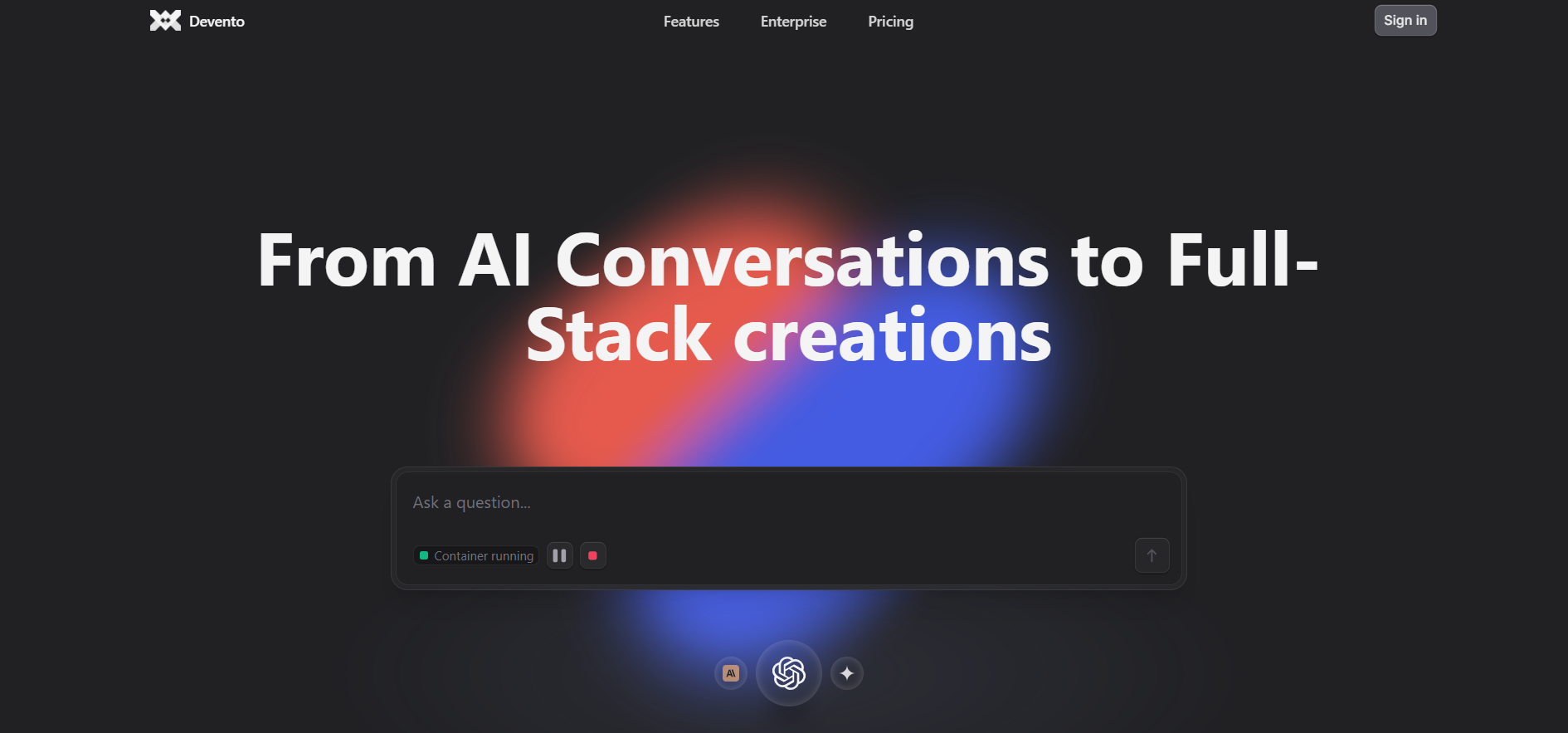

Devento AI
Devento AI is a comprehensive AI marketing and automation platform designed to help businesses create, manage, and optimize their digital marketing campaigns effortlessly. It combines natural language processing, predictive analytics, and automation to craft tailored marketing content and data-driven campaigns. With Devento AI, users can generate ad copies, schedule posts, manage audience targeting, and track performance across platforms — all from a single dashboard. The tool empowers marketers and agencies to enhance engagement, boost ROI, and streamline operations through automation.


Devento AI
Devento AI is a comprehensive AI marketing and automation platform designed to help businesses create, manage, and optimize their digital marketing campaigns effortlessly. It combines natural language processing, predictive analytics, and automation to craft tailored marketing content and data-driven campaigns. With Devento AI, users can generate ad copies, schedule posts, manage audience targeting, and track performance across platforms — all from a single dashboard. The tool empowers marketers and agencies to enhance engagement, boost ROI, and streamline operations through automation.


Devento AI
Devento AI is a comprehensive AI marketing and automation platform designed to help businesses create, manage, and optimize their digital marketing campaigns effortlessly. It combines natural language processing, predictive analytics, and automation to craft tailored marketing content and data-driven campaigns. With Devento AI, users can generate ad copies, schedule posts, manage audience targeting, and track performance across platforms — all from a single dashboard. The tool empowers marketers and agencies to enhance engagement, boost ROI, and streamline operations through automation.

KiloCode Enterprise is a secure, open-source, and fully transparent AI coding platform designed for engineering teams and large organizations that require complete control over their AI development workflow. With robust governance features, private deployment options, audit logs, and model-agnostic flexibility, KiloCode Enterprise empowers teams to use AI coding assistants safely while maintaining compliance, privacy, and full visibility across their organization.


Kilocode-Enterpris..
KiloCode Enterprise is a secure, open-source, and fully transparent AI coding platform designed for engineering teams and large organizations that require complete control over their AI development workflow. With robust governance features, private deployment options, audit logs, and model-agnostic flexibility, KiloCode Enterprise empowers teams to use AI coding assistants safely while maintaining compliance, privacy, and full visibility across their organization.


Kilocode-Enterpris..
KiloCode Enterprise is a secure, open-source, and fully transparent AI coding platform designed for engineering teams and large organizations that require complete control over their AI development workflow. With robust governance features, private deployment options, audit logs, and model-agnostic flexibility, KiloCode Enterprise empowers teams to use AI coding assistants safely while maintaining compliance, privacy, and full visibility across their organization.
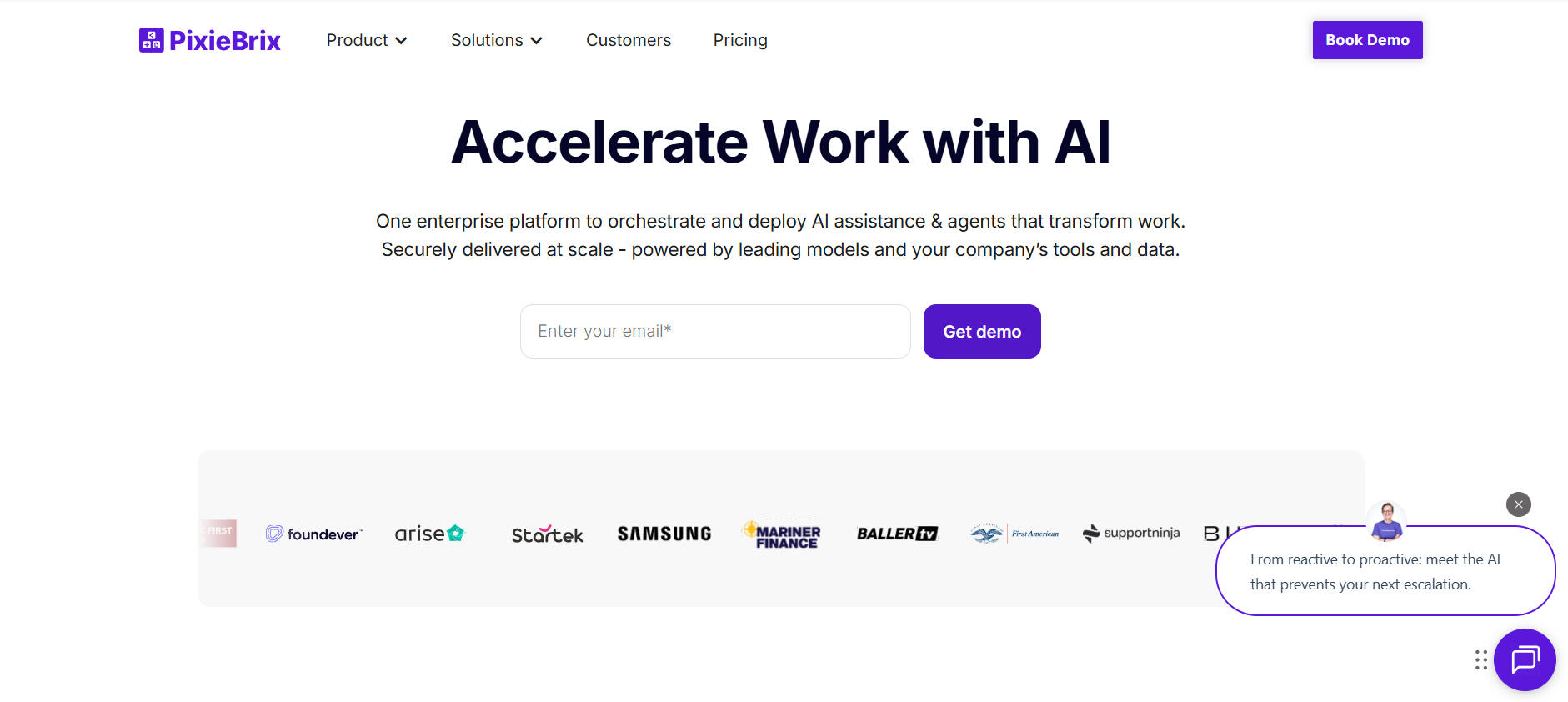

Pixie Brix
PixieBrix is an enterprise-grade AI orchestration platform that enables organizations to deploy, manage, and scale AI assistance and intelligent agents across their workflows. Rather than offering isolated AI tools, PixieBrix provides a unified system to integrate AI capabilities directly into existing applications, processes, and employee workflows. It securely connects leading AI models with company tools and proprietary data, allowing businesses to transform how work is performed without compromising governance or compliance.


Pixie Brix
PixieBrix is an enterprise-grade AI orchestration platform that enables organizations to deploy, manage, and scale AI assistance and intelligent agents across their workflows. Rather than offering isolated AI tools, PixieBrix provides a unified system to integrate AI capabilities directly into existing applications, processes, and employee workflows. It securely connects leading AI models with company tools and proprietary data, allowing businesses to transform how work is performed without compromising governance or compliance.


Pixie Brix
PixieBrix is an enterprise-grade AI orchestration platform that enables organizations to deploy, manage, and scale AI assistance and intelligent agents across their workflows. Rather than offering isolated AI tools, PixieBrix provides a unified system to integrate AI capabilities directly into existing applications, processes, and employee workflows. It securely connects leading AI models with company tools and proprietary data, allowing businesses to transform how work is performed without compromising governance or compliance.
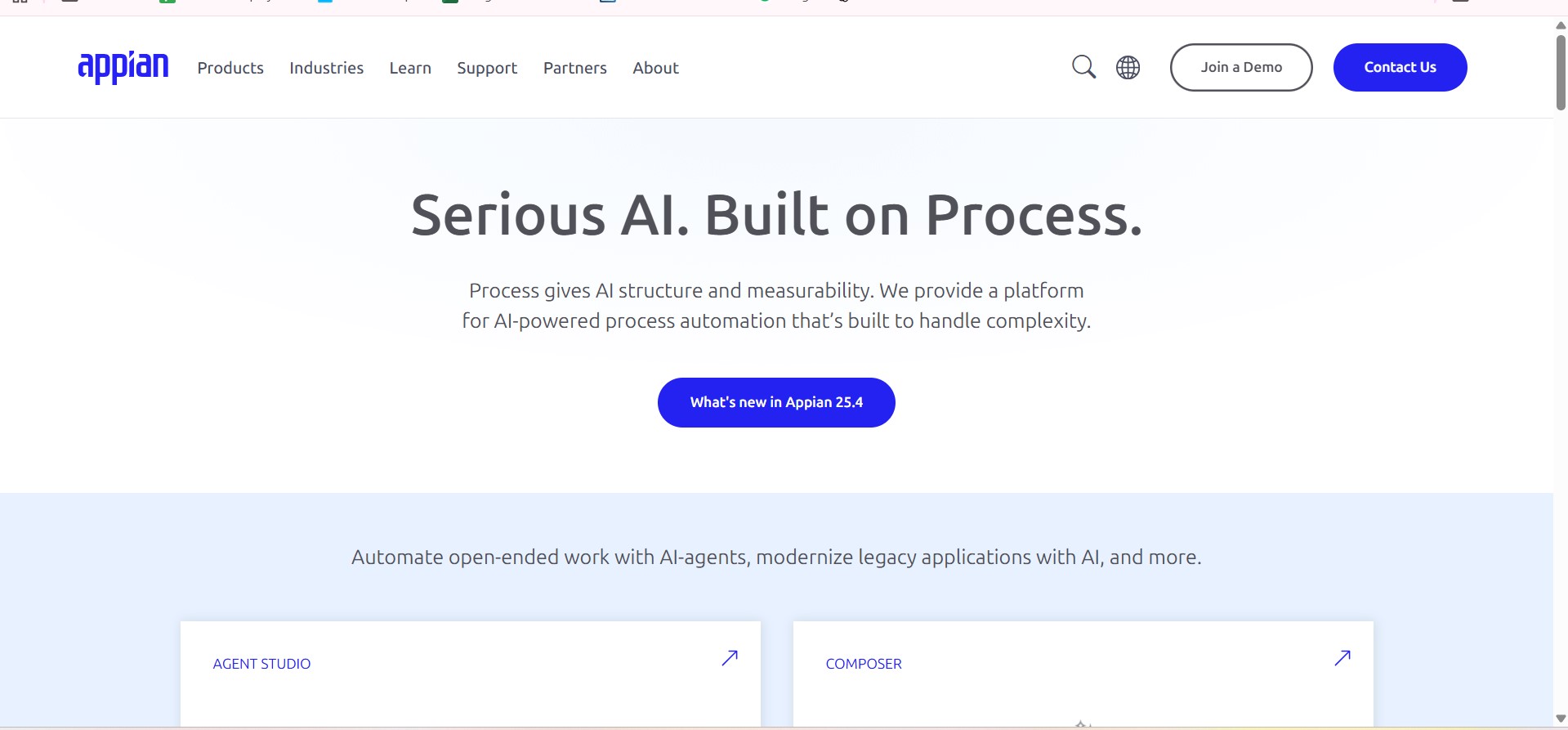

Appian
Appian is a leading low-code automation platform that enables organizations to design, build, and deploy business applications quickly. With AI-powered process automation, workflow management, and integration tools, Appian helps businesses streamline operations, improve efficiency, and accelerate digital transformation.


Appian
Appian is a leading low-code automation platform that enables organizations to design, build, and deploy business applications quickly. With AI-powered process automation, workflow management, and integration tools, Appian helps businesses streamline operations, improve efficiency, and accelerate digital transformation.


Appian
Appian is a leading low-code automation platform that enables organizations to design, build, and deploy business applications quickly. With AI-powered process automation, workflow management, and integration tools, Appian helps businesses streamline operations, improve efficiency, and accelerate digital transformation.
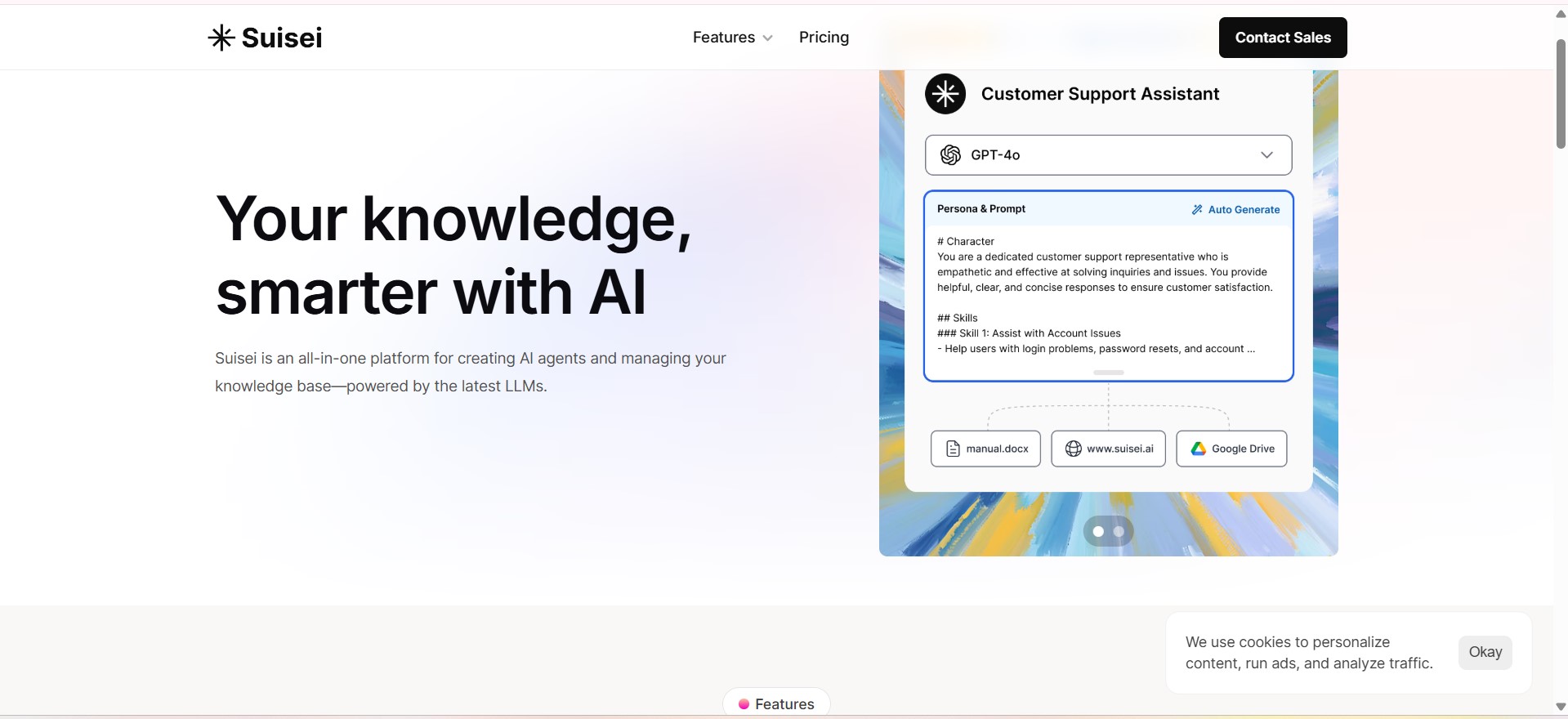

Suisei AI
Suisei AI is a modern AI platform designed to help individuals and businesses build, manage, and deploy intelligent AI agents tailored to their needs. At its core, Suisei positions itself as an all-in-one workspace for AI agents and knowledge management, powered by the latest large language models (LLMs) such as GPT, Claude, and Google’s Gemini.The platform’s primary focus is on AI agents—automated assistants that can perform a wide variety of tasks. Users can create custom AI agents without writing code, using intuitive templates or starting from scratch.


Suisei AI
Suisei AI is a modern AI platform designed to help individuals and businesses build, manage, and deploy intelligent AI agents tailored to their needs. At its core, Suisei positions itself as an all-in-one workspace for AI agents and knowledge management, powered by the latest large language models (LLMs) such as GPT, Claude, and Google’s Gemini.The platform’s primary focus is on AI agents—automated assistants that can perform a wide variety of tasks. Users can create custom AI agents without writing code, using intuitive templates or starting from scratch.


Suisei AI
Suisei AI is a modern AI platform designed to help individuals and businesses build, manage, and deploy intelligent AI agents tailored to their needs. At its core, Suisei positions itself as an all-in-one workspace for AI agents and knowledge management, powered by the latest large language models (LLMs) such as GPT, Claude, and Google’s Gemini.The platform’s primary focus is on AI agents—automated assistants that can perform a wide variety of tasks. Users can create custom AI agents without writing code, using intuitive templates or starting from scratch.
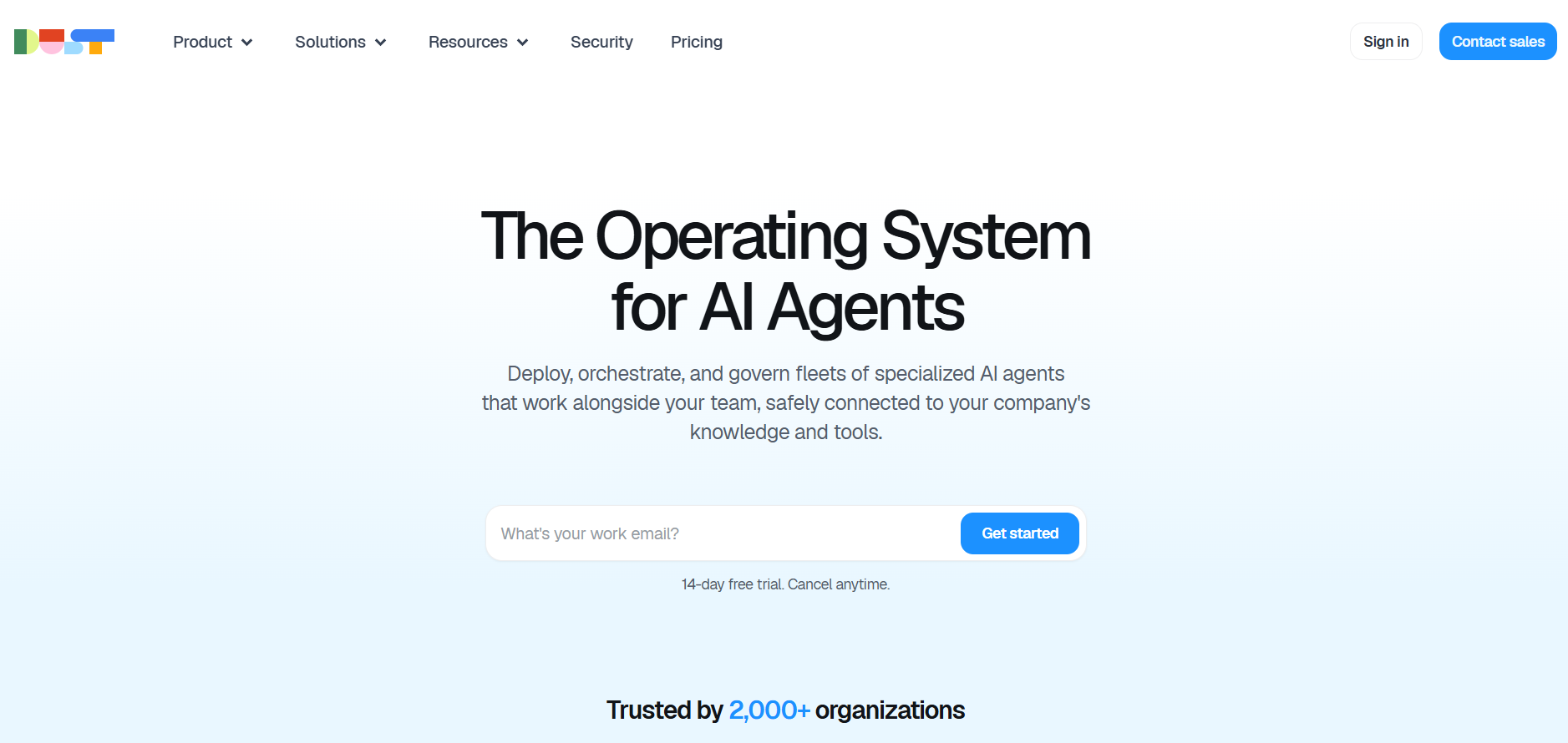

Dust
Dust is an operating system for AI agents, built to help organizations deploy, orchestrate, and govern large fleets of specialized AI agents that work alongside human teams. It integrates directly with a company’s internal knowledge, workflows, and tools, enabling agents to take actions, provide insights, automate tasks, and operate safely within controlled environments. Dust focuses on enterprise-grade security, governance, and interoperability, allowing teams to build and manage multi-agent ecosystems without losing oversight or control. With the ability to connect agents to internal data sources and business processes, Dust turns AI into an operational layer that scales across departments and functions.


Dust
Dust is an operating system for AI agents, built to help organizations deploy, orchestrate, and govern large fleets of specialized AI agents that work alongside human teams. It integrates directly with a company’s internal knowledge, workflows, and tools, enabling agents to take actions, provide insights, automate tasks, and operate safely within controlled environments. Dust focuses on enterprise-grade security, governance, and interoperability, allowing teams to build and manage multi-agent ecosystems without losing oversight or control. With the ability to connect agents to internal data sources and business processes, Dust turns AI into an operational layer that scales across departments and functions.


Dust
Dust is an operating system for AI agents, built to help organizations deploy, orchestrate, and govern large fleets of specialized AI agents that work alongside human teams. It integrates directly with a company’s internal knowledge, workflows, and tools, enabling agents to take actions, provide insights, automate tasks, and operate safely within controlled environments. Dust focuses on enterprise-grade security, governance, and interoperability, allowing teams to build and manage multi-agent ecosystems without losing oversight or control. With the ability to connect agents to internal data sources and business processes, Dust turns AI into an operational layer that scales across departments and functions.
Editorial Note
This page was researched and written by the ATB Editorial Team. Our team researches each AI tool by reviewing its official website, testing features, exploring real use cases, and considering user feedback. Every page is fact-checked and regularly updated to ensure the information stays accurate, neutral, and useful for our readers.
If you have any suggestions or questions, email us at hello@aitoolbook.ai
